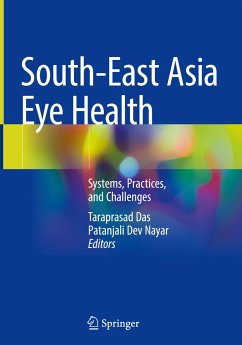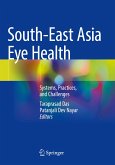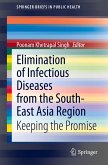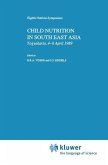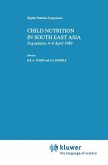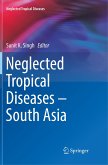The book covers all aspects of eye health in South-East Asia from public health to health system to education to industry in 6 sections. The World Health Organization (WHO) South-East Asia region comprises of 11 countries - Bangladesh, Bhutan, DPR Korea, India, Indonesia, Maldives, Myanmar, Nepal, Sri Lanka, Thailand and Timor-Leste. This region is home to 26% of world population; there is a disproportionate amount of blindness (30.6%) and visual impairment (36%).
This is a first of its kind book that discusses common conditions of visual impairment and blindness in the South-East Asia region. In addition, the book documents the current eye care industry in the region and the contribution of all eye health INGOs in eye care program planning and service delivery for many decades. Majority of the countries in the South-East Asia region are categorized in 'middle-income country' group. This book discusses the common challenges in these countries such as, suboptimal publicexpenditure in health, acute shortage of skilled eye health workforce, and rudimentary health industry.
The book covers the following 6 sections:
1. Geographic description and health indices of the region
2. Health system evolved over years, including universal eye health, health financing and health management information system (HMIS)
3. Common eye problems including non-communicable disease NCD (and diabetic retinopathy), neglected tropical disease NTD (and Trachoma)
4. Health workforce in the region that includes ophthalmologists, optometrists, and allied ophthalmic personnel
5. Eye health support in the region of 13 international non-government organizations (INGOs) working for decades
6. Eye health industry in the region that includes spectacles, ophthalmic devices and equipment and the pharma industry
The book would be a useful resource for ophthalmologists, all publichealth personnel and policy makers in eye health in the South-East Asia region specifically and all ophthalmologists and scientists interested in public health all over the world as well as for program planning to reach the 'Health for All' strategy by 2030 (United Nations Sustainable Development Goal, SDG 2030).
Hinweis: Dieser Artikel kann nur an eine deutsche Lieferadresse ausgeliefert werden.
This is a first of its kind book that discusses common conditions of visual impairment and blindness in the South-East Asia region. In addition, the book documents the current eye care industry in the region and the contribution of all eye health INGOs in eye care program planning and service delivery for many decades. Majority of the countries in the South-East Asia region are categorized in 'middle-income country' group. This book discusses the common challenges in these countries such as, suboptimal publicexpenditure in health, acute shortage of skilled eye health workforce, and rudimentary health industry.
The book covers the following 6 sections:
1. Geographic description and health indices of the region
2. Health system evolved over years, including universal eye health, health financing and health management information system (HMIS)
3. Common eye problems including non-communicable disease NCD (and diabetic retinopathy), neglected tropical disease NTD (and Trachoma)
4. Health workforce in the region that includes ophthalmologists, optometrists, and allied ophthalmic personnel
5. Eye health support in the region of 13 international non-government organizations (INGOs) working for decades
6. Eye health industry in the region that includes spectacles, ophthalmic devices and equipment and the pharma industry
The book would be a useful resource for ophthalmologists, all publichealth personnel and policy makers in eye health in the South-East Asia region specifically and all ophthalmologists and scientists interested in public health all over the world as well as for program planning to reach the 'Health for All' strategy by 2030 (United Nations Sustainable Development Goal, SDG 2030).
Hinweis: Dieser Artikel kann nur an eine deutsche Lieferadresse ausgeliefert werden.

